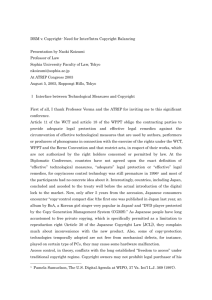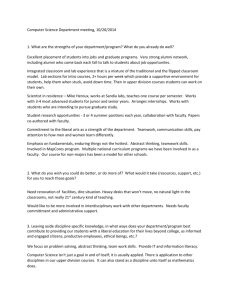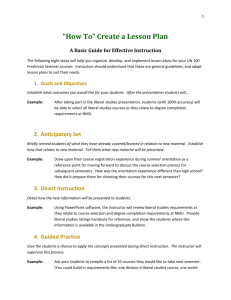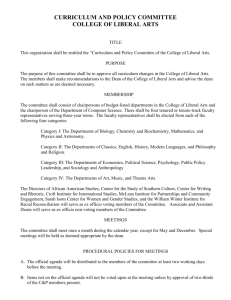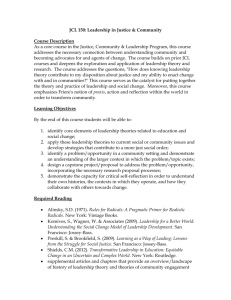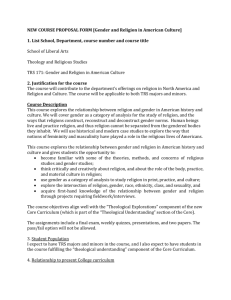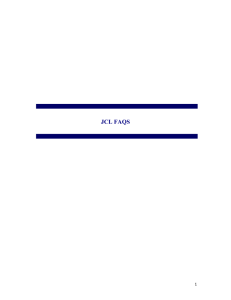JCL Proposed Changes to the Liberal & Civic Studies Program
advertisement
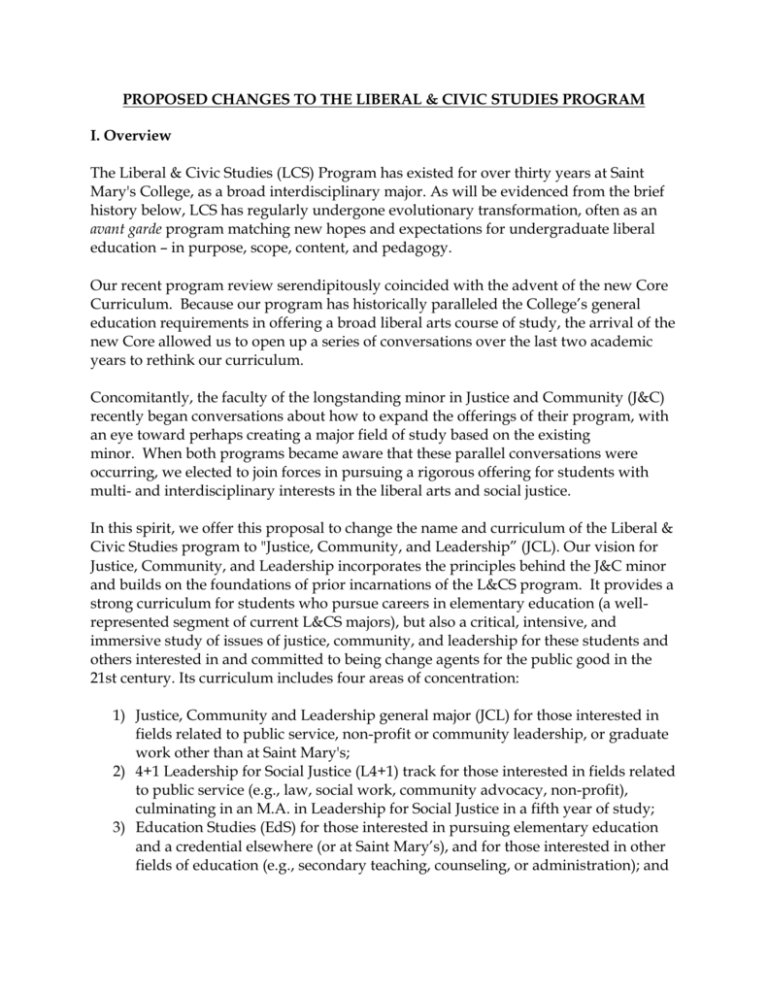
PROPOSED CHANGES TO THE LIBERAL & CIVIC STUDIES PROGRAM I. Overview The Liberal & Civic Studies (LCS) Program has existed for over thirty years at Saint Mary's College, as a broad interdisciplinary major. As will be evidenced from the brief history below, LCS has regularly undergone evolutionary transformation, often as an avant garde program matching new hopes and expectations for undergraduate liberal education – in purpose, scope, content, and pedagogy. Our recent program review serendipitously coincided with the advent of the new Core Curriculum. Because our program has historically paralleled the College’s general education requirements in offering a broad liberal arts course of study, the arrival of the new Core allowed us to open up a series of conversations over the last two academic years to rethink our curriculum. Concomitantly, the faculty of the longstanding minor in Justice and Community (J&C) recently began conversations about how to expand the offerings of their program, with an eye toward perhaps creating a major field of study based on the existing minor. When both programs became aware that these parallel conversations were occurring, we elected to join forces in pursuing a rigorous offering for students with multi- and interdisciplinary interests in the liberal arts and social justice. In this spirit, we offer this proposal to change the name and curriculum of the Liberal & Civic Studies program to "Justice, Community, and Leadership” (JCL). Our vision for Justice, Community, and Leadership incorporates the principles behind the J&C minor and builds on the foundations of prior incarnations of the L&CS program. It provides a strong curriculum for students who pursue careers in elementary education (a wellrepresented segment of current L&CS majors), but also a critical, intensive, and immersive study of issues of justice, community, and leadership for these students and others interested in and committed to being change agents for the public good in the 21st century. Its curriculum includes four areas of concentration: 1) Justice, Community and Leadership general major (JCL) for those interested in fields related to public service, non-profit or community leadership, or graduate work other than at Saint Mary's; 2) 4+1 Leadership for Social Justice (L4+1) track for those interested in fields related to public service (e.g., law, social work, community advocacy, non-profit), culminating in an M.A. in Leadership for Social Justice in a fifth year of study; 3) Education Studies (EdS) for those interested in pursuing elementary education and a credential elsewhere (or at Saint Mary’s), and for those interested in other fields of education (e.g., secondary teaching, counseling, or administration); and 4) 4+1 Teachers for Tomorrow (TFT) for those students who pursue elementary education, culminating in a credential and Masters degree in a fifth year of study. A minor in Justice, Community and Leadership (replacing the existing Justice & Community minor) is outlined near the end of this document. There are no specialized minors related to the other existing areas of concentration at this time. II. Program history The program began under the name Diversified Liberal Arts in the 1980s as the curriculum for students interested in elementary education. It was also advertised as the "other" interdisciplinary program with the Integral Program. Students completed all general education requirements within the program. Under that curriculum, the program formally had tracks for elementary education (meeting state requirements for the California "waiver" programs for credential preparation) and general liberal arts. The latter was advertised for pre-law students and others who sought a broad liberal arts foundation for careers in other aspects of education such as counseling or administration. The program changed its name and curriculum twice in the 1990s, first to Liberal Studies and then to Liberal & Civic Studies. It maintained its curriculum for elementary education students, and developed the first 4+1 undergraduate to graduate pathway program. Through Teachers for Tomorrow (TFT), students complete their undergraduate degree, an elementary education credential, and a Master of Arts in Education (M.A.Ed). Liberal & Civic Studies promoted three emphases: breadth of study, depth of study, and integration. The breadth occurred in course requirements across disciplines at Saint Mary's. The depth occurred through a required minor (for which LCS required a minimum of four upper division courses). The integration occurred through the LCS core courses (four full credit and two partial credit courses) and a required assessment and portfolio process. Across the tracks, all LCS students were expected to explore issues of justice, equity and leadership in current events and social problems, such as class, gender, race, and environmental sustainability. As noted, Liberal & Civic Studies has been a program committed to understanding and adapting to the changes in liberal education and undergraduate education, both in terms of content and pedagogy. The program was the first at Saint Mary's to require service learning formally in its curriculum, in education and other non-profit and public service settings. This initial service has been expanded to become an essential and identifying feature of all tracks in the program. It also was the first program on campus to include a formal portfolio-assessment component for students, through a process that includes peer and faculty evaluation, public presentation, reflection assignments, and an interview process with three faculty from across the undergraduate disciplines. This curriculum has been expanded and strengthened in a technology-based, developmental and integrative model, including attention to core learning outcomes, alliance with the SMC core requirements, oral and written critical thinking and communication skills, and culminating capstone and thesis requirements. It should be noted that the Teachers for Tomorrow has become a beacon for prospective students who seek early and regular immersion in elementary classrooms, and a clear and coherent pathway to undergraduate and graduate degrees. Students, parents, and educators across California regularly offer high praise for this dual-degree program, noting the well-developed curriculum, the high caliber of educators we produce, the reduced cost of attaining both degrees in terms of finances, time, and energy; and the commitment to developing teachers interested in issues of equity and justice, and being change agents in the field of education. III. Rationale for the changes The changes here proposed strengthen the program by · making explicit the focus on leadership that has heretofore been implied; · increasing the focus and depth of the program, through changes to curricular requirements within the program and a reduction of less essential interdisciplinary requirements; · providing depth and rigor in the core courses rather than a required additional minor; · establishing a revised mission statement, program description and learning outcomes accompanied by a set of core critical theories, critical texts, and critical pedagogies that are developmental in nature and scaffolded across the curriculum; · revising and strengthening the program capstone and culminating experiences that address core theories, texts and pedagogies; · improving collaboration with the SMC Core Curriculum and other related disciplinary partners (e.g., KSOE, related SOLA departments, and at least one SEBA department: Economics); · adding and improving 4+1 pathways for all students in the program. Moreover, the changes in the Justice, Community, and Leadership program respond to the interests and needs of the College. First, the existing Liberal & Civic Studies program is aligned with the former general education requirements. Thus in the presence of a new SMC Core Curriculum, an updated curriculum is in order. Secondly, in line with the Academic Blueprint, we seek to be a program with contemporary curricula that respond to societal needs, inclusion of servant-leadership in our offerings, and curricular pathways between undergraduate and graduate programs. As a program with a long history of transformed--and transformational--curricula, we intend to develop students who are capable, confident, creative, and committed to being leaders in their communities. The new minor in Justice, Community and Leadership also provides opportunities for students of all majors to enhance their awareness, understanding and mastery of these three important areas to any field of study. IV. Proposed changes A. Our Mission To prepare students through a social justice framework to be leaders who address critical challenges of our times. B. Program Description Justice, Community and Leadership is an interdisciplinary program that emphasizes critical inquiry, global perspectives, ethical ideals, social and environmental stewardship, leadership, education, and self-assessment. Our social justice framework uses multiple empirical and theoretical perspectives and contemporary pedagogies of community engagement to inspire lifelong leadership and service for the common good, especially in education, law, government, and advocacy. C. Learning Outcomes Students who complete this program will be able to: 1. [Knowledge] Demonstrate an understanding of engaged pedagogy, critical theory, and social systems as related to justice and leadership studies and be able to apply theoretical explanations to empirical examples. 2. [Research] Use data analysis and interpretation, appropriate library and information literacy skills, and field research to articulate and interpret the complexities of significant social issues. 3. [Application] By using leadership studies and critical theory, assess a complex social or community issue and develop multiple viable strategies that contribute to a more just social order. 4. [Communication] Effectively use oral, written, and new media formats to educate, advocate, and collaborate with multiple audiences. 5. [Reflection] Demonstrate, through written and oral self-assessment and reflection, an understanding of the impact of their own academic learning experience and how it prepares them for a life of active citizenship. D. Requirements Along with the general major in Justice, Community and Leadership, there are three concentrations that students may pursue. [Please note that apart from Collegiate Seminar, Composition, lower-division Theological Understanding, language and three out of four January Term courses, students meet all requirements of the SMC Core Curriculum within the major and their chosen concentration. (Please see attached course table.)] Each option requires a specific number of courses: Justice, Community and Leadership general major: 14.25 courses Leadership for Social Justice 4 + 1 concentration: 17.25 courses (prior to 5th year) Education Studies: 20.50 courses Teachers for Tomorrow: 23.50 courses (prior to 5th year) Common Curriculum All students in the JCL program must take the following required courses: Lower Division (2 courses) --JCL 10: Introduction to Justice, Community and Leadership --ECON 10: Economics and Society Upper Division (5.25 courses) --JCL 120 Theory and Inquiry in Justice, Community and Leadership --JCL 130 Environmental Responsibility in a Global Community --JCL 140 Justice and Leadership in the Global Community --JCL 150 Leadership in Justice and Community --JCL 196 Senior Capstone Project --JCL 190 Senior Assessment & Portfolio (.25 senior portfolio) Requirements outside the program (7-10 courses): In addition to the above courses, JCL majors meet other program requirements in conjunction with the SMC Core by selecting from a specific menu of options as they complete Core requirements. In addition to the menu selections listed below, JCL is in conversation with the Math department about development of a course in data analysis related to social justice issues. · Theological Understanding (1 course): After meeting the lower division Theological Understanding requirement of the Core Curriculum, students must take one upper-division course from a menu of selected core-designated courses (as requested by the sponsoring departments and approved by the JCL advisory board), which might include: --Philosophy 130: Ethics --Theology & Religious Studies 117: Wealth and Poverty in the Bible --Theology & Religious Studies 141: Christian Ethics --Theology & Religious Studies 142: Medical Ethics --Theology & Religious Studies 143: Catholic Social Teaching --Theology & Religious Studies 151: Judaism --Theology & Religious Studies 153: Eastern Religions --Theology & Religious Studies 154: Hinduism --Theology & Religious Studies 155: Buddhism --Theology & Religious Studies 156: Religions of India --Theology & Religious Studies 166: Spirituality in Practice: Catholics in America --Theology & Religious Studies 171: Gender and Religion in American Culture · Artistic Understanding: Analysis and Creative Practice (2 courses): Students will take two courses from a menu of selected core-designated courses (as requested by the sponsoring departments and approved by the JCL advisory board), which might include: Artistic Understanding and Creative Practice: --Art 55: Digital Foundations 1: Photo, Video and Sound --Art 65: Digital Foundations 2: Web Design and Interactive Art --Communication 2: Communication and Social Understanding --Performing Arts 50: Interactive Theatre Artistic Understanding: Artistic Analysis: --English 153: American Ethnic Writers and Oral Traditions --English 154: Studies in African American Literature --English 173: Women Writers --English 23: American Voices --Performing Arts 1: Perceiving the Performing Arts --Performing Arts 10: Rock to Back --Performing Arts 113: Jazz and Blues in America --Spanish 11: Introduction to Literature Artistic Understanding: Creative Practice (if not met by combined course above): --Art 1: Studio Foundations 1 --Performing Arts 12: Applied Music --Performing Arts 19: Performing Ensembles --Performing Arts 37: Theater Performance Lab --Performing Arts 75/175: Dance Company --Performing Arts 90: Choreography · Social, Historical, Cultural Understanding (JCL and L4+1, 1 course; EdS and TFT, 2 courses): As noted above, all JCL students – regardless of concentration – must take Econ 10 (Economics and Society). In addition, students will take one course from a menu of selected core-designated courses (as requested by the sponsoring departments and approved by the JCL advisory board), which might include: --Anthropology 1: Introduction to Social and Cultural Anthropology --Communication 112: Interpersonal Communication --History 17: History of the United States to 1877 --History 18: History of the United States since 1877 --History 117: 20th Century Europe --History 136: Immigration and Ethnic Relations in American History --History 138: The Development of Modern American Culture --History 139: History of Women in America --History 141: African-American History: 1865 to the Present --History 151: Women in Latin American History --History 152: Revolution in Latin America --History 155: Latin American Environmental History --History 163: Ethnic Identities and Conflict in China --Politics 1: Introduction to Comparative Politics --Sociology 2: Introduction to Sociology --Sociology 4: Social Problems --Sociology 101: The Sociological Imagination --Women's and Gender Studies 1: Introduction to Women's Studies [SPECIAL NOTE: Along with ECON 10, students in the EdS and TFT concentrations must take PSYCH 001 and HIST 17 or 18. Those students will meet the SHCU requirement through those courses.] ·Scientific Understanding (JCL and L4+1, 1 course; EdS and TFT, 2 courses): One course and lab from a menu of selected core-designated courses (as requested by the sponsoring departments and approved by the JCL advisory board), which might include: --Biology 88/89: Biology of Women --Environmental and Earth Science 40/41: Geology and the Earth --Environmental and Earth Science 50/51: Earth and Life through Time --Environmental and Earth Science 75/76: Wetlands --Environmental and Earth Science 92/93: Introduction to Environmental Science [SPECIAL NOTE: Students in the EdS and TFT concentrations must take BIO 50/51 and any physical science course. Those students will meet the SU requirement through those courses.] · Mathematical Understanding (JCL and L4+1, 1 course; EdS and TFT: 2 courses): Students pursuing the JCL and L4+1 options must take either --MATH 4 (Statistics) OR --MATH 10 (The Art and Practice of Math). Students in the EdS and TFT concentrations must take --MATH 1 and --MATH 101 Both MATH 1 and 101 are specially designed for future teachers. · January Term (1 course): During one January Term, students in the general JCL major and L4+1 concentrations must take: -- one CE-designated Jan Term as one of their four required Jan Term courses. Students in the EdS and TFT concentrations must take: --JAN 121: Field Experience in Education. JCL Specialized Concentrations Each of the concentrations in the Justice, Community and Leadership Program offers students specialized study and experiences to prepare them for their chosen intellectual or vocational paths. Concentration 1: 4+1 Leadership for Social Justice (L4+1) (3 additional courses) Students in the L4+1 concentration take all of the courses noted above under the general major. In addition, L4+1 students begin their graduate work in their fourth year of study by taking: 1. LDSH graduate course (TBD) 2. LDSH graduate course (TBD) 3. LDSH graduate course (TBD) Concentration 2: Education Studies (EdS) (3.25 additional courses) Additional requirements for EdS include the following: 1. 2. 3. 4. 5. 6. 7. EDUC 20, Introduction to the Teaching Profession EDUC 144 Cognitive Development JCL 123 (.25 Cultural Competency -- in development) JCL 124 (.25 Mini Math Methods) JCL 125 (.25 Text-Based Instruction in Middle Schools) JCL 126 (.25 Teaching the Arts -- in development) KINES (.25 Physical Education in Elementary Schools -- in development) Concentration 3: Teachers for Tomorrow 4 + 1 (TFT) (6.25 additional courses) Students in the TFT concentration take all of the courses noted above under the general major, along with the additional courses noted for Education Studies students. In addition, TFT students begin their graduate work in their fourth year of study by taking: 1. MSTE 345 2. MSTE 243 3. MSTE 349 Minor: Justice, Community and Leadership (6.25 - 7.25 courses) This multidisciplinary minor, housed within the Justice, Community and Leadership Program, incorporates community engagement and issues of social justice into the experiences and curriculum of students interested in learning about the principles and practices of justice, community and leadership. The minor must consist of at least five courses outside of the student’s major(s). The following courses are required: Lower Division (2 courses) ECON 10: Economics and Society AND JCL 10: Introduction to Justice, Community and Leadership or SOC 4: Social Problems (Community Engagement-designated section) Upper Division: (4 .25 - 5.25 courses) --Theories in Social Justice (1): JCL 120 (Theory and Inquiry in Justice, Community and Leadership) or POL 115 (Theories of Justice) --Theories in Advanced Justice and Leadership (1): JCL 150 --Upper division electives (2): Choose two courses from a menu of selected core-designated courses (as requested by the sponsoring departments and approved by the JCL advisory board), which might include: JCL 120 (if not already taken as theory) JCL 130: Environmental Responsibility in a Global Community JCL 140: Justice and Leadership in the Global Community BUSAD 181: Business Ethics and Social Responsibility COMM 161: Communication and Social Justice ECON 150: Environmental and Resource Economics ECON 152: Labor Economics ECON 192: Economic Development HIST 136: Immigration and Ethnic Relations in American History HIST 138: The Development of Modern American Culture HIST 139: History of Women in America HIST 141: African-American History: 1865 to the Present HIST 151: Women in Latin American History HIST 152: Revolution in Latin America HIST 155: Latin American Environmental History HIST 163: Ethnic Identities and Conflict in China PHIL 130: Ethics POL 106: Labor Politics POL 110: Minority Politics POL 115: Theories of Justice (if not already taken as theory course) POL 125: Human Rights POL 126: Food Politics POL 135: Environmental Politics SOC 101: The Sociological Imagination SOC 114: Urban Studies SOC 115: Wealth and Poverty SOC 116: New Immigrants and Refugees SOC 120: Social Movements and Social Change SOC 122: Education, Culture and Society SOC 124: Justice and Community SOC 128: Crime and Delinquency SOC 134: Contemporary Social Issues TRS 117: Wealth and Poverty in the Bible TRS 141: Christian Ethics TRS 142: Medical Ethics TRS 143: Catholic Social Teaching TRS 151: Judaism TRS 153: Eastern Religions TRS 154: Hinduism TRS 155: Buddhism TRS 156: Religions of India TRS 166: Spirituality in Practice: Catholics in America TRS 171: Gender and Religion in American Culture WGS 100: Research Seminar on Women’s and Gender Issues WGS 177: Feminist and Gender Theories --Capstone experience (.25 or 1.25) If the student’s primary major requires a capstone project, the student can choose to incorporate JCL emphases in the project for that program. If not, the student can choose from one of the following: JCL 196 SLICE (Student Leaders in Community Engagement) or SOC 140 In addition to a capstone project, all minors will complete: JCL 190 (.25) Assessment and Portfolio

